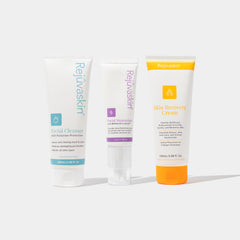May is National Skin Cancer Awareness Month, a crucial time to focus on the prevention, detection, and treatment of the most common cancer in the United States.
With over 5 million cases of skin cancer diagnosed annually, the condition represents a significant burden on healthcare systems and patient well-being. Physicians across specialties, including radiation oncology, dermatology, and plastic surgery, play a pivotal role in addressing this epidemic through early detection, advanced treatment modalities, and post-treatment care. This article explores evidence-based strategies for prevention, treatment, and recovery, highlighting solutions like Rejuvaskin's Mineral Facial Sunscreen, Scar Heal Kits, and Skin Recovery Cream.
Skin Cancer Prevention: Evidence-Based Insights
The vast majority of skin cancers—up to 90%—are caused by ultraviolet (UV) radiation from sun exposure or artificial sources like tanning beds. Studies emphasize the importance of daily sunscreen use in reducing the incidence of both melanoma and non-melanoma skin cancers. A randomized clinical trial found that consistent sunscreen use decreased the risk of squamous cell carcinoma by 40% and melanoma by 50% (Green et al., 2011).
In clinical practice, recommending broad-spectrum sunscreens with a high SPF is essential. Products like Rejuvaskin's Mineral Facial Sunscreen provide robust protection against both UVA and UVB rays, while being lightweight and non-comedogenic, making it ideal for patients with sensitive or post-treatment skin.
Advancements in Treatment: A Multidisciplinary Approach
For non-melanoma skin cancers, including basal and squamous cell carcinomas, treatment options often involve surgical excision or Mohs micrographic surgery. Radiation oncology becomes vital in cases where surgery is contraindicated or incomplete, providing targeted therapy with minimal impact on surrounding healthy tissue. For melanoma, adjuvant immunotherapy and targeted therapies have transformed outcomes, with studies showing improved progression-free survival rates (Weber et al., 2015).
Post-treatment care remains a cornerstone of comprehensive care. Rejuvaskin's Scar Heal Kits are effective tools for managing surgical or radiation-induced scars. The kits include silicone sheeting, which has been shown in clinical studies to reduce scar size and improve texture (Mustoe et al., 2002). Silicone's ability to regulate moisture and increase collagen synthesis aids in both aesthetic and functional outcomes for patients recovering from skin cancer surgeries.
Supporting Skin Recovery: Promoting Healing and Skin Integrity
Patients undergoing radiation therapy or surgical treatments often experience skin irritation, dryness, or radiation dermatitis. Proper skin care is critical to alleviate symptoms and promote healing. Rejuvaskin's Skin Recovery Cream, enriched with anti-inflammatory and hydrating ingredients, addresses these needs. A clinical evaluation of topical agents for radiation dermatitis highlighted the importance of barrier creams in reducing erythema and enhancing skin integrity (McQuestion, 2011).
For long-term maintenance, emphasizing daily sunscreen use and regular dermatological check-ups can prevent recurrence or new skin cancers.
Call to Action
National Skin Cancer Awareness Month serves as a reminder to healthcare providers to educate patients on prevention, ensure timely diagnosis, and provide holistic care for skin cancer treatment and recovery. Integrating advanced skincare solutions, like Rejuvaskin's Mineral Facial Sunscreen, Scar Heal Kits, and Skin Recovery Cream, into your practice can enhance patient outcomes and satisfaction.
Together, we can reduce the burden of skin cancer and help patients achieve optimal recovery.
References
Green, A. C., Williams, G. M., Logan, V., & Strutton, G. M. (2011). Reduced melanoma after regular sunscreen use: randomized trial follow-up. Journal of Clinical Oncology, 29(3), 257-263.
Weber, J., Mandala, M., Del Vecchio, M., Gogas, H., Arance, A., Cowey, C. L., ... & Ascierto, P. A. (2015). Adjuvant nivolumab versus ipilimumab in resected stage III or IV melanoma. New England Journal of Medicine, 377(19), 1824-1835.
Mustoe, T. A., Cooter, R. D., Gold, M. H., Hobbs, F. D. R., Ramelet, A. A., Shakespeare, P. G., ... & Ziegler, U. E. (2002). International clinical recommendations on scar management. Plastic and Reconstructive Surgery, 110(2), 560-571.
McQuestion, M. (2011). Evidence-based skin care management in radiation therapy: clinical update. Seminars in Oncology Nursing, 27(2), e1-e17.




















